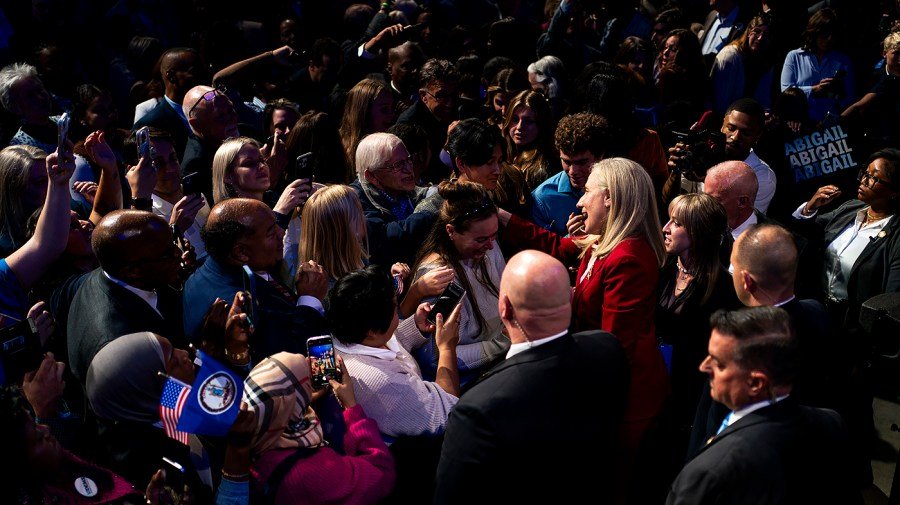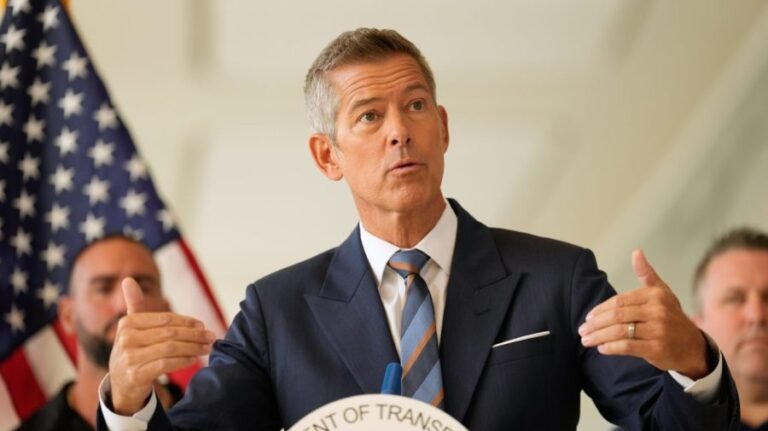
Republicans are reeling over the apparent erosion of support from Latino voters, a voting bloc that boosted the party in 2024, in Tuesday’s off-year elections.
According to CNN exit polling, New Jersey Gov.-elect Mikie Sherrill (D) won the support of 68 percent of Latino voters, while Virginia Gov.-elect Abigail Spanberger (D) received 67 percent support from Latino voters.
The results mark a shift from just one year ago, when the voting bloc helped propel President Trump to victory. Republicans say the time is now to course-correct ahead of next year’s midterms.
“Unfortunately Latinos are leaving the Republican Party after giving us a monumental chance in 2024,” said Rep. Maria Elvira Salazar (R-Fla.) in an X video posted after Tuesday’s results. “In New Jersey and Virginia, Hispanics moved back more than 25 points to the Democratic Party.”
“This is our wakeup call,” she said.
The clearest sign of that wake-up call was in New Jersey, where, according to US Census data, the Hispanic population makes up 21.6 percent of the state’s population. According to the Pew Research Center, Latino voters make up 16 percent of the state’s electorate.
Trump made significant inroads in enclaves in the state dominated by Latinos in 2024. The president became the first Republican to win Passaic County in over 30 years last year. One year later, Sherrill carried the county by nearly 15 points.
Democrats also won back Hispanic voters in Virginia a year after Republicans made inroads in the state. Spanberger won the Northern Virginia city of Manassas Park, which has a large Hispanic population, by 42 percent. Former Vice President Harris, by comparison, won it by just under 20 points last year.
“I think a lot of it was driven by concerns about immigration enforcement, cost of living pressures, and really, just a sense that the Republican outreach lacked authenticity,” said Alfredo Ortiz, the CEO of the conservative advocacy group Job Creators Network.
“This kind of outreach to the Hispanic community, it’s not just a ‘Hey, let’s just reach out to them five weeks or six weeks before an election,’ and the Republican Party doesn’t seem to get that,” he continued, calling for “year-round outreach” to the Hispanic community.
Carlos Rogdrguez, president of the Latino Action Alliance, noted that it would be “idealistically naive” to expect Hispanic voters to automatically vote for Republicans.
“You have to ask for the vote,” Rodriguez told The Hill. “It starts with wanting the vote bad enough to spend money to get it.”
Ortiz pointed to the impact of the affordability message in Tuesday’s elections as having a significant impact on Hispanic voters as it did on voters across the board.
“The Democrats seemed to have played that card better even though the Republican Party really has been delivering on elements of affordability like lowering inflation, cost of gas prices, cost of electricity, and steps that are going towards that that were included in the ‘One Big, Beautiful Bill,’” he said, noting that the GOP’s messaging needs to be more disciplined, particularly with the Hispanic community.
“Rather than focusing on selling the wins of the ‘One Big Beautiful Bill’ and affordability, I think they just went too far on immigration enforcement,” Ortiz added.
Fifty-three percent of Latino voters named the cost of living and inflation as their top concern, according to a Unidos Bipartisan Poll of Hispanic Voters: The Road to 2026 poll published by CBS News on Monday. Twenty percent said the same about immigration after housing and health care.
The same poll also found that 59 percent said their rights and liberties feel less secure than before when asked about immigration.
“I think the immigration enforcement has gone too far with the Hispanic community and I think you kind of saw some of the pullback of Hispanics overall,” Ortiz said.
But not all Republicans are viewing the shift as a major warning sign, arguing that they are paying attention to the broader movement of Hispanic and Latino voters since Trump’s first election in 2016.
“Democrats have ignored Hispanic communities over the past nine years while millions of working families rejected their radical, socialist agenda. Republicans will continue to earn the support of Hispanic voters because we are working to deliver opportunity, security, and a better life,” said Christian Martinez, national Hispanic press secretary at the National Republican Congressional Committee.
In fact, the NRCC has already started targeting Hispanic voters ahead of the midterms using New York City Mayor-elect Zohran Mamdani’s (D) win on Tuesday.
Earlier this week, the committee rolled out in nine Democratic House districts and two Republican House districts with large Hispanic populations tying Democrats to Mamdani, who identifies as a democratic socialist.
This is not the first time Republicans have used this strategy to appeal to Hispanic voters. Republicans have been massively successful in Florida, which boasts large populations from Venezuela and Cuba, which are socialist and communist states, respectively.
The day after the election, Trump traveled to Miami to speak at the America Business Forum, and took an opportunity to criticize Mamdani.
“Now the Democrats are so extreme that Miami will soon be the refuge for those fleeing communism in New York City. They flee,” the president said.
Rodriguez noted that while that message may play well with parts of the Hispanic community, it may not resonate with the base as a whole.
“He was in Florida talking to Latinos in South Florida,” Rodriguez said. “A strong anti-socialist, anti-communist message resonates immensely in that universe. If you were doing that in New York City or in Union City or in Newark, New Jersey, I would advise otherwise.”
“Read the room is the first order of business, the first rule of a campaign,” he said.


